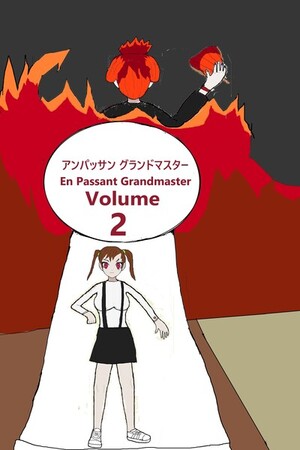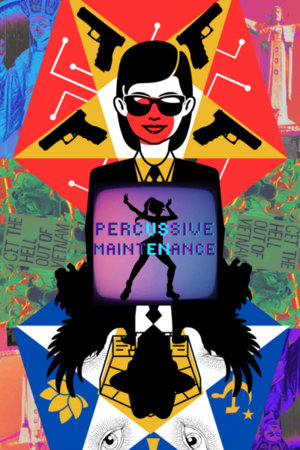Chapter 4:
Paper and Daemons
City of Flowers
The answer is very simple; if Iris can’t figure out someone by herself, then she needs help, an aid. And if she cannot rely on the thoughts in her own head to figure things out, then what she has to do is rely on someone else’s. Something else’s.
When she arrives home after her run-in with the girl in the tunnels, her immediate action is to browse her phone’s digital library for daemon parts.
She brings up the interface; a holographic and interactable screen that flashes a hot pink when she prods a finger into it. This little application is her life and blood, the culmination of every program she has managed to disassemble and salvage for parts. Sometimes when she needs to think, or if she is forced to sit and do nothing at all, she will find herself idly flicking through the lists. It is comforting to know that this library is her doing—that she'd caused these parts to exist outside of their intended daemons.
Iris works into the evening, long after her mother has called her for dinner. She takes the heat sensors from a basic house alarm system, weaves their endings into parts salvaged from the thought relay function. Another sensor, this time from a daemon that changes the room’s lighting based on the user’s mood. Another part. Another.
It is only when she is done with her first iteration that she realises her stomach is empty, and that the light streaming through her windows has turned blue. She checks the time. 9:00PM.
Iris shakes her head and brushes a stray strand of her hair from her face. Her mother calls her work ethic both explosive and lethargic, and she could not agree more. Explosive when she cares—lethargic when she is careless.
She turns off her phone and pads down the stairs. All of the lights in the hallway are off, but her mother has kindly left the lamps above the dining table on. A bowl containing cold rice and glossy strips of meat sits on the table, untouched.
Her mother too, sits on the other side of the table. Untouched and unmoving, like a marble statue carved to contemplate. Iris swallows and takes her seat.
“You left your computer on,” her mother begins.
“I did.”
“I saw your grades on your student portal.”
This is a violation of privacy, but Iris does not bring it up. Her mother’s violations of privacy have saved her from sneaking deadlines on more than one occasion. She owes a lot to her violations.
Her mother continues, “I didn’t know you were barely passing until I saw. Why didn’t you tell me?”
“Passing is good,” Iris retorts. “Passing gets you degrees.”
“Yes, well—” Her mother sighs, picks up the cup that is closest to her, puts it back down, then sighs again. “Passing is just that. Good.”
“So there’s no problem.”
“No. There’s a big problem.”
“No?”
Another sigh. “Iris, you’ve just skipped dinner—to do what? I don’t know why you’re like this now; you were doing so well in high school. What happened?”
“Like what?” Iris grits her teeth. She has seen this conversation thousands of times, played out every possible outcome in her head like an old tape from the Age of Metal. She wins in none of them; in an argument with your family, there is nothing to win but pride and tears. All she can do is wait for her mother to finish.
“You don’t care, Iris. Do you even care about school anymore?” Her mother clenches and unclenches her hands. “It’s always been half the work with you. What’ll happen after graduation? After you’ve gotten the career you’ve wanted? You have to try harder, Iris. Higher ups can smell incompetence from a mile off—they're like bloodhounds, and they'll fire you if they have the chance. I don’t want that to happen to you, alright?”
“It’ll be better, mum. I’ll get better.” Iris clutches her phone under the table. A go-to distraction for when her mother is rambling about her future is to idly flick through the menus on her phone; she is fighting the urge to do just that. “I’m gonna be fine.”
“You’ve been saying that you’re going to get better later your whole life. When are you actually going to be better?”
“Now. I promise.” Iris hates to lie. Perhaps it is instinctive, but at this moment, her phone chooses to turn itself on—she can tell from the way its body vibrates slightly in her grasp.
“What are you going to do then? What’s your plan?”
The thoughts in her head fly both fast and slow, like a feverish dream. It could be an alarm, a reminder noted on her phone, a physical and bound diary. She will do none of these things.
She feels a disappointment that is not hers. It washes over her like a bucket of ice. It is all she can feel. She has felt frustration, lethargic, even rage at her lack of actions, but never disappointment. Never something so harrowing.
Is this what being her mother is like?
“A…a timetable," she stammers.
“And are you going to keep a physical timetable or will it be on your phone?”
"Phone."
"Paper would be more tangible. I used paper when I was your age."
"Nobody uses paper anymore, mum."
The disappointment shifts like a season, turning into something warmer; Iris sees an old vase and yellowing paper, sticks on fire and ceramic pots of dinner. She sees books catching fire, their moon white pages blackening, wafting off into the air. Her stomach goes inexplicably hollow, and it is a sensation that is beyond the need for subsistence. She hungers for another time, long ago.
But she has never laid hands on a book, never cooked with clay by fireside. Whose memories are these?
Her phone lights up, then fades in her palms. All of a sudden, the intrusive thoughts of someone else are gone.
"Alright." Her mother gets up from her seat and embraces Iris in an awkward hug. When she draws back, she holds Iris' face in both hands like she is cradling an orb. "Promise me you'll set a timetable. Okay?"
"Promise," says Iris.
Her mother hugs her again. "Remember that mummy loves you," she says, before she heads back towards the hallway and into her room again. The glass doors slide shut with a click.
When Iris turns her phone back on, she sees a single, dull message,
FATAL HANDLING ERROR
SYSTEM CRASHED 22:37
and suddenly, the interviews seem more doable, less insurmountable.
The daemon's application icon flickers, then winks out.




Please sign in to leave a comment.